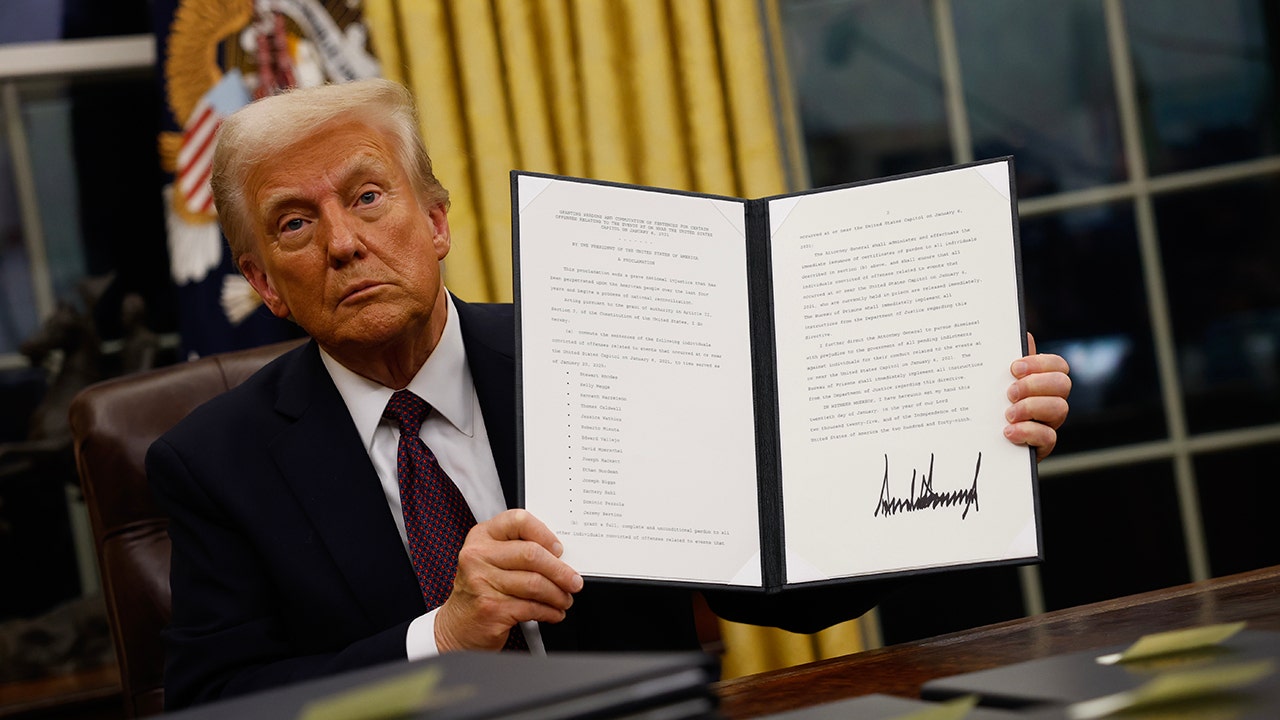France Demands Stronger EU Response To US Tariffs

Table of Contents
France's Specific Concerns Regarding US Tariffs
France's concerns regarding the US tariffs are multifaceted and deeply rooted in the significant impact on its key industries and its commitment to fair trade principles.
Impact on French Agricultural Exports
The US tariffs have dealt a severe blow to key French agricultural exports. Products like cheese, wine, and agricultural machinery have experienced significant declines in sales to the US market.
- Quantifiable Economic Damage: Estimates suggest a 15% decrease in French agricultural exports to the US since the tariff implementation, resulting in an estimated loss of €5 billion and over 10,000 jobs in the affected regions.
- Disproportionately Affected Regions: Regions like Burgundy (wine), Normandy (cheese), and Brittany (agricultural machinery) have been disproportionately impacted, leading to increased unemployment and economic hardship in these rural areas.
- Government Support Measures: The French government has introduced temporary financial aid packages for affected farmers and businesses, including subsidies and loan guarantees, but these measures are proving insufficient to offset the long-term damage caused by the tariffs.
Concerns about Fair Trade Practices
France argues that the US tariffs are not only economically damaging but also violate fundamental principles of fair trade and established WTO agreements.
- WTO Rule Violations: France contends that the US tariffs are not justified under existing WTO rules and constitute unfair trade practices, citing violations related to non-discrimination and the use of legitimate trade remedies.
- WTO Dispute Settlement Procedures: France has actively participated in ongoing WTO dispute settlement procedures, aiming to challenge the legality of the US tariffs and seek redress for the damage caused to French exporters.
- Potential for Legal Challenges: Further legal challenges are anticipated, with France potentially seeking additional remedies through the WTO system if the current dispute resolution efforts fail to yield satisfactory results.
Demand for Retaliatory Measures
France is advocating for a more assertive EU response, pushing for stronger retaliatory measures against the US beyond the current, comparatively limited, actions.
- Proposed Retaliatory Measures: France proposes targeted tariffs on specific US goods, potentially impacting sectors like agricultural products, cosmetics and technology, to create counter-pressure and incentivize the US to reconsider its approach.
- Economic and Political Consequences: While such measures could provide short-term relief for affected French industries, they also risk escalating the trade conflict and potentially damaging broader EU-US economic relations.
- Opposition within the EU: There is internal division within the EU concerning the best strategy. Some member states favor a more conciliatory approach to avoid further trade wars, while others support France's calls for stronger action.
The EU's Current Response to US Tariffs
The EU has implemented some countermeasures, but they have been met with criticism from France as insufficient.
Existing Retaliatory Measures
The EU has imposed retaliatory tariffs on a limited range of US goods.
- Goods Affected by EU Tariffs: These include products such as certain agricultural goods, steel, and bourbon.
- Effectiveness Assessment: The effectiveness of these measures remains a point of contention, with many arguing that they have not been sufficient to offset the negative impact of the US tariffs and have not effectively addressed the underlying issue of unfair trade practices.
- Limitations of the Current Approach: The EU's response has been criticized for being too limited in scope and scale, failing to adequately address the significant economic damage caused by the US tariffs.
Internal EU Divisions on the Issue
Significant disagreements persist among EU member states regarding the optimal response to the US tariffs.
- Differing Economic Interests: Member states have diverse economic interests and varying levels of dependence on trade with the US, leading to conflicting perspectives on the appropriate response.
- Political Challenges in Reaching a Consensus: Finding a common ground amongst the diverse interests has proven challenging, requiring intricate negotiations and compromises.
- Potential Compromises: Discussions are underway to explore possible compromises, potentially involving a combination of retaliatory measures and diplomatic efforts to resolve the trade dispute.
Potential Consequences of an Insufficient EU Response
Failure to address France's concerns could have far-reaching consequences for both France and the EU as a whole.
Economic Impact on France and the EU
A weak response will likely exacerbate the negative economic consequences.
- Projected Losses: Continued inaction could lead to further significant losses in GDP and trade volume, affecting both French and European economies.
- Industry and Employment Impact: Several industries, especially those reliant on exports to the US, could face job losses and business closures.
- Ripple Effects: The trade dispute could negatively impact global trade relationships and create uncertainty for other international markets.
Political Ramifications for the EU
An inadequate response could damage the EU's international standing and its relationship with the US.
- Impact on Future Trade Negotiations: The EU's credibility in future trade negotiations could be undermined, potentially weakening its negotiating position in other trade deals.
- Risk of Further Trade Conflicts: Failure to address the US tariffs effectively may embolden other countries to pursue similar protectionist measures, leading to a wider escalation of trade conflicts.
- Impact on EU Unity and Coherence: The ongoing dispute has already strained relations between EU member states, and an unsatisfactory resolution could further fracture the bloc’s unity.
Conclusion
France's demand for a stronger EU response to US tariffs underscores the significant economic and political challenges confronting the European Union. The escalating trade dispute necessitates a decisive and unified approach from the EU to mitigate the substantial negative impacts on French and European industries. Failure to adequately address France's concerns and implement robust countermeasures could have severe economic and political repercussions. The EU must act decisively to protect its interests and send a clear message that it will not tolerate unfair trade practices. Addressing the France US Tariffs EU Response effectively requires immediate attention and a collaborative effort from all EU member states to find a comprehensive and effective solution. A strong, unified EU response is crucial for navigating this complex issue and safeguarding the future of EU-US trade relations.

Featured Posts
-
 Elizabeth Hurley Stuns In Bikinis During Maldives Getaway
May 09, 2025
Elizabeth Hurley Stuns In Bikinis During Maldives Getaway
May 09, 2025 -
 Trump To Finalize Uk Trade Agreement Key Details And Potential Impact
May 09, 2025
Trump To Finalize Uk Trade Agreement Key Details And Potential Impact
May 09, 2025 -
 Strictly Come Dancing Katya Joness Departure And The Wynne Evans Allegations
May 09, 2025
Strictly Come Dancing Katya Joness Departure And The Wynne Evans Allegations
May 09, 2025 -
 Elizabeth Hurleys Maldives Bikini Vacation Photos And Highlights
May 09, 2025
Elizabeth Hurleys Maldives Bikini Vacation Photos And Highlights
May 09, 2025 -
 Expensive Babysitting Costs Lead To Even Higher Daycare Expenses A Cautionary Tale
May 09, 2025
Expensive Babysitting Costs Lead To Even Higher Daycare Expenses A Cautionary Tale
May 09, 2025
Latest Posts
-
 News From The Bangkok Post The Push For Better Transgender Rights
May 10, 2025
News From The Bangkok Post The Push For Better Transgender Rights
May 10, 2025 -
 The Bangkok Post And The Ongoing Struggle For Transgender Equality
May 10, 2025
The Bangkok Post And The Ongoing Struggle For Transgender Equality
May 10, 2025 -
 The Impact Of Trumps Executive Orders On The Transgender Community A Call For Stories
May 10, 2025
The Impact Of Trumps Executive Orders On The Transgender Community A Call For Stories
May 10, 2025 -
 Examining Transgender Equality Issues Highlighted By The Bangkok Post
May 10, 2025
Examining Transgender Equality Issues Highlighted By The Bangkok Post
May 10, 2025 -
 The Bangkok Post And The Fight For Transgender Equality In Thailand
May 10, 2025
The Bangkok Post And The Fight For Transgender Equality In Thailand
May 10, 2025
